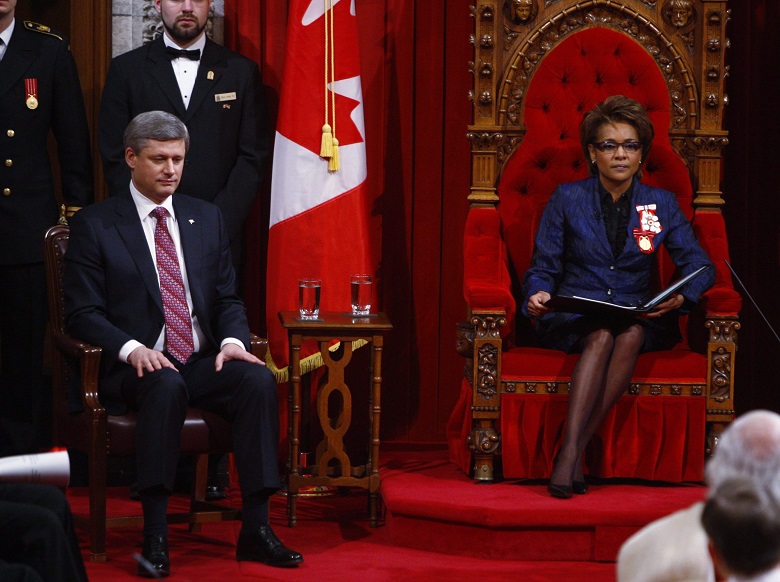Engineer, songstress, mother, pilot, astronaut, linguist, Olympic flag-bearer, scuba diver, governor-general designate.

It’s a stretch to imagine any Canadian checking off all of those boxes, but Julie Payette, astonishingly, has managed it.
Standing alongside Prime Minister Justin Trudeau on Thursday afternoon in Ottawa, Payette was confirmed to be his choice for the Queen’s next representative in Canada. Both the NDP and Conservative leaders sent their best wishes.
Payette called it a “great adventure.”
The news of the surprise appointment first broke in a series of leaks to various media outlets on Wednesday evening, prompting an overwhelmingly positive reaction on social media.
The 53-year-old Quebec native will take over this fall from current Governor General David Johnston, a well-liked former university administrator who was appointed by Stephen Harper and served for a total of seven years.
A range of talents
Payette’s professional resumé, stretching back to the late 1980s, is both diverse and impressive.
Educated at McGill University and the University of Toronto, her background in engineering and applied science eventually led her to IBM, and then on to the Canadian Space Agency (CSA). The CSA plucked Payette out of a field of 5,330 applicants in 1992 to become one of four new astronauts.
She was Canada’s second female astronaut and would eventually become the first Canadian to board the International Space Station.
Roberta Bondar, the country’s first female astronaut, told Global News that she was “really thrilled” to hear about Payette’s new job, calling her former colleague “fair-minded,” “insightful” and talented.
“She’ll bring a range of talents for sure, as well as a lot of insight and acumen both from the business world and in arts and science,” Bondar said.
“The previous governor general has done a great job for the period of seven years that he was in the role … Now we’re moving into the next five years, and there are different things that will challenge us in Canada.”
Payette, a mother of two, is widely expected to use her new role as a platform for encouraging young Canadians to enter the so-called STEM fields (science, technology, engineering and mathematics).
Her appointment did raise eyebrows among some in Ottawa who expected Trudeau to select someone with an Aboriginal background, but officials have stressed that the former astronaut remains emblematic of other key government priorities and themes — including Trudeau’s much-touted feminism and the country’s growing science and technology sectors.
In total, Payette has logged 611 hours in space across two missions, the first in 1999 and the second a decade later in 2009.
But her time at the CSA is only one chapter in her backstory. In her free time, Payette has become an accomplished pianist and classical singer and has performed with symphony orchestras from Montreal to Switzerland.
Continuing the tradition of alternating between francophone and anglophone governors general, she easily checks off the requirement for French-English bilingualism that every GG must fulfil. But she can converse in an additional four languages: Spanish, Italian, Russian and German.
READ MORE: Julie Payette a top contender for governor general role
She has served on multiple boards of directors, including those attached to Queen’s University, Canada’s Own the Podium Olympic program, the National Bank of Canada and the Montreal Science Centre, among others.
Payette holds 18 honorary doctorates, is a member of the Canadian Aviation Hall of Fame, an Officer of the Order of Canada and has been awarded NASA’s Exceptional Service Medal.
Bondar, who has stayed in regular contact with Payette over the years, said that women often need to be over-achievers to even be noticed. Payette’s myriad achievements will serve as an example for all Canadians, she added.
“All of it combines to show people that you can not just be in one small niche, but you can be diverse as well. Not just in terms of the type of population we are, but in our interests and ability to be educated and to have a productive life in society.”
What will she do?
As Canada’s governor general, Payette’s role will be largely a symbolic one. Based out of her new home at Rideau Hall, she will earn an annual salary of just over $290,000 and her chief duty will be to ensure a functioning and stable Parliament.
The governor general also serves as commander-in-chief of the Canadian Armed Forces, delivers the speech from the throne that opens each new session of Parliament, swears in the prime minister and the cabinet, grants royal assent to bills that pass through the House of Commons and the Senate, signs off on official documents and represents Canada abroad and at official events.
A grasp of constitutional law is also a must, as Payette may be called upon to make difficult choices in rare, but tricky, political situations.
In 2008, for instance, Michaëlle Jean was asked to approve the shutdown (or proroguing) of Parliament by Stephen Harper, who faced the imminent defeat of his government in the House of Commons. Jean ultimately consented, reportedly fearing that a refusal of Harper’s request would provoke a crisis of confidence in Canada’s political system. The choice was a highly controversial one.












Comments